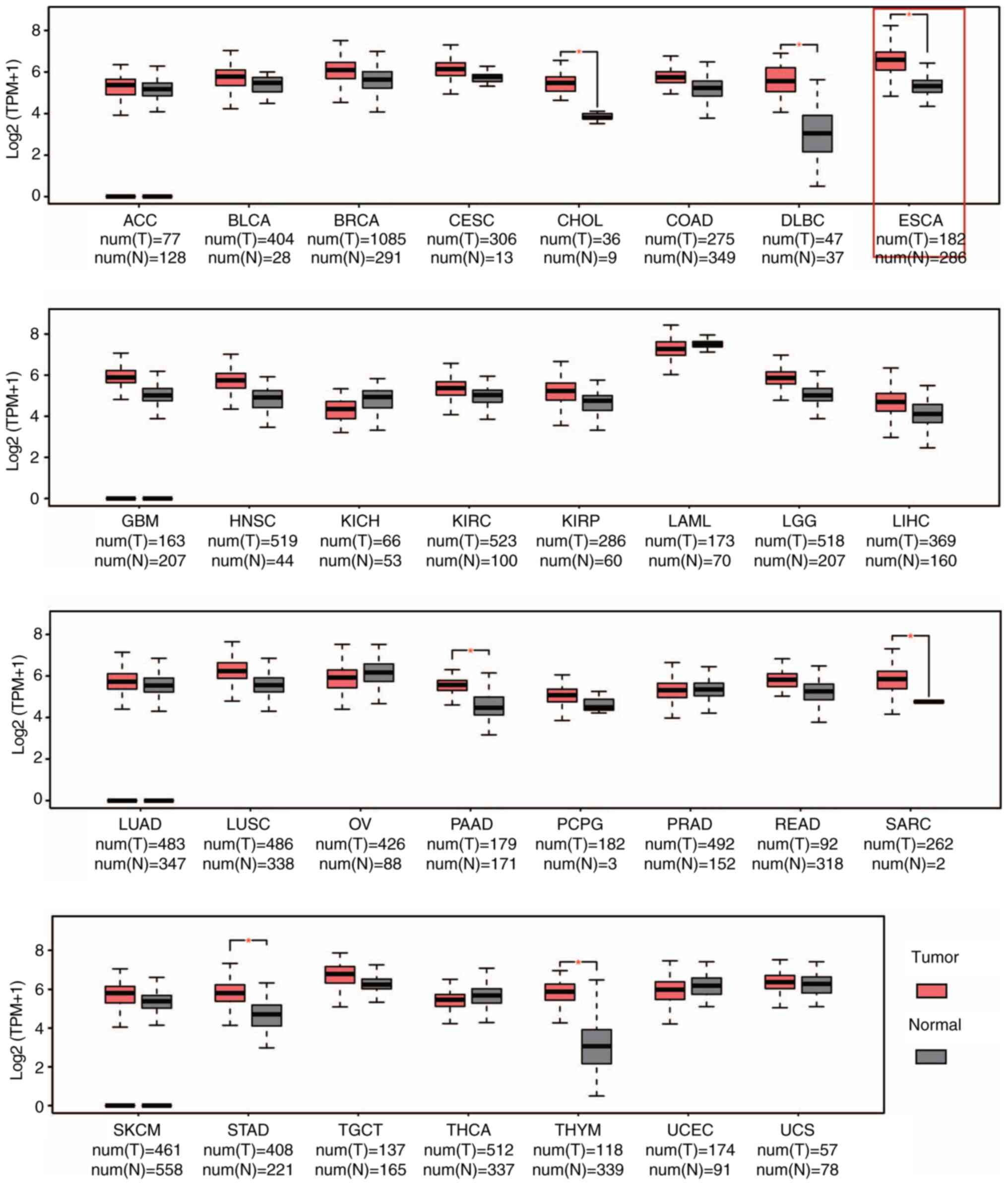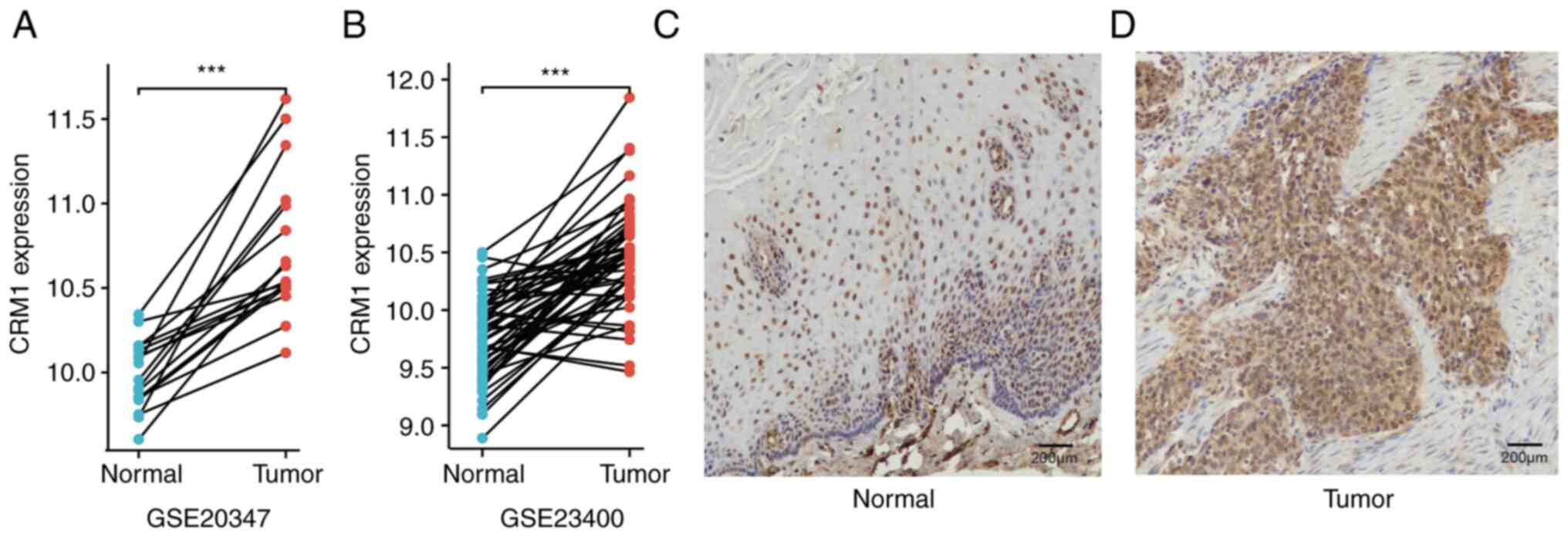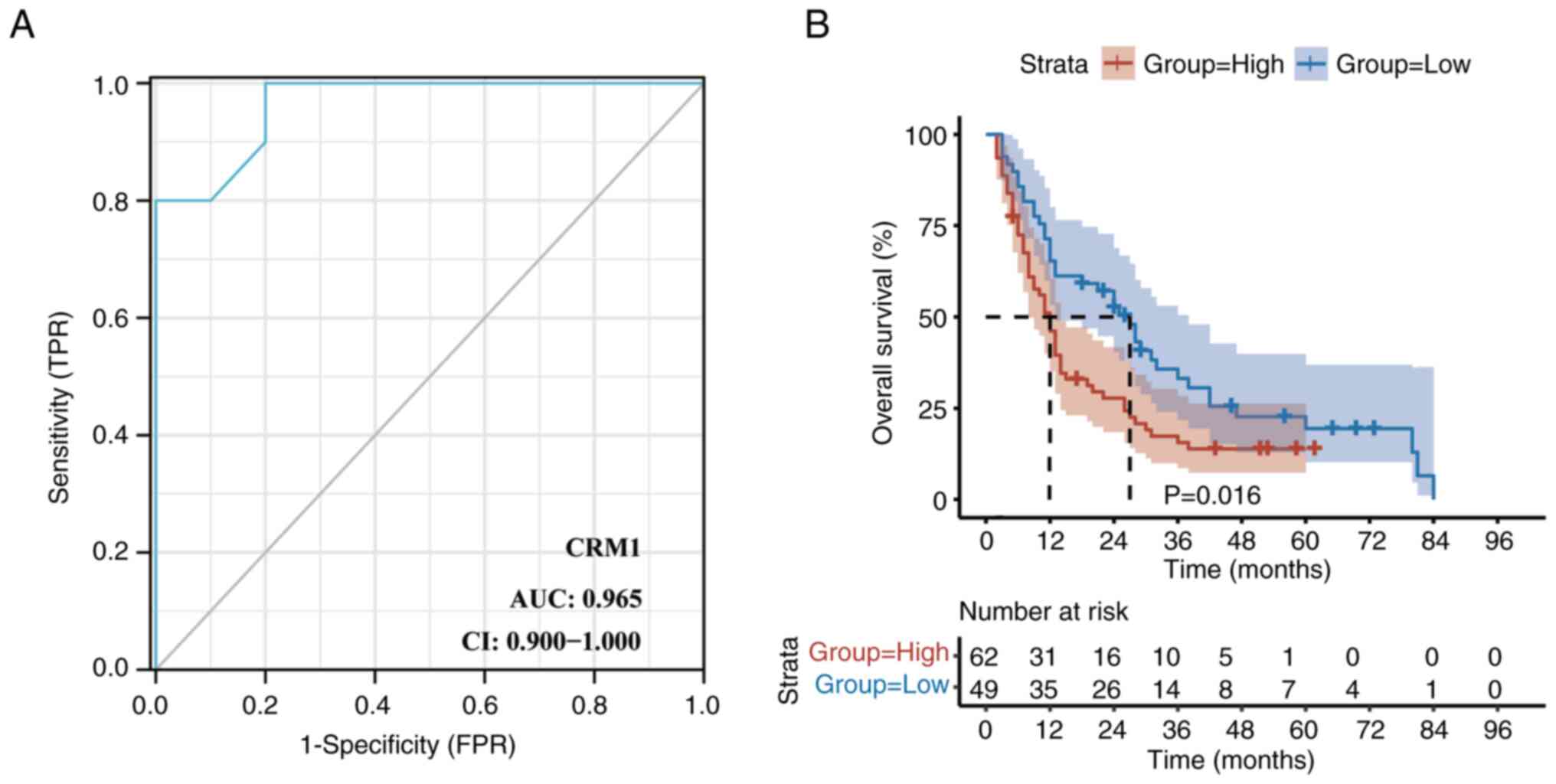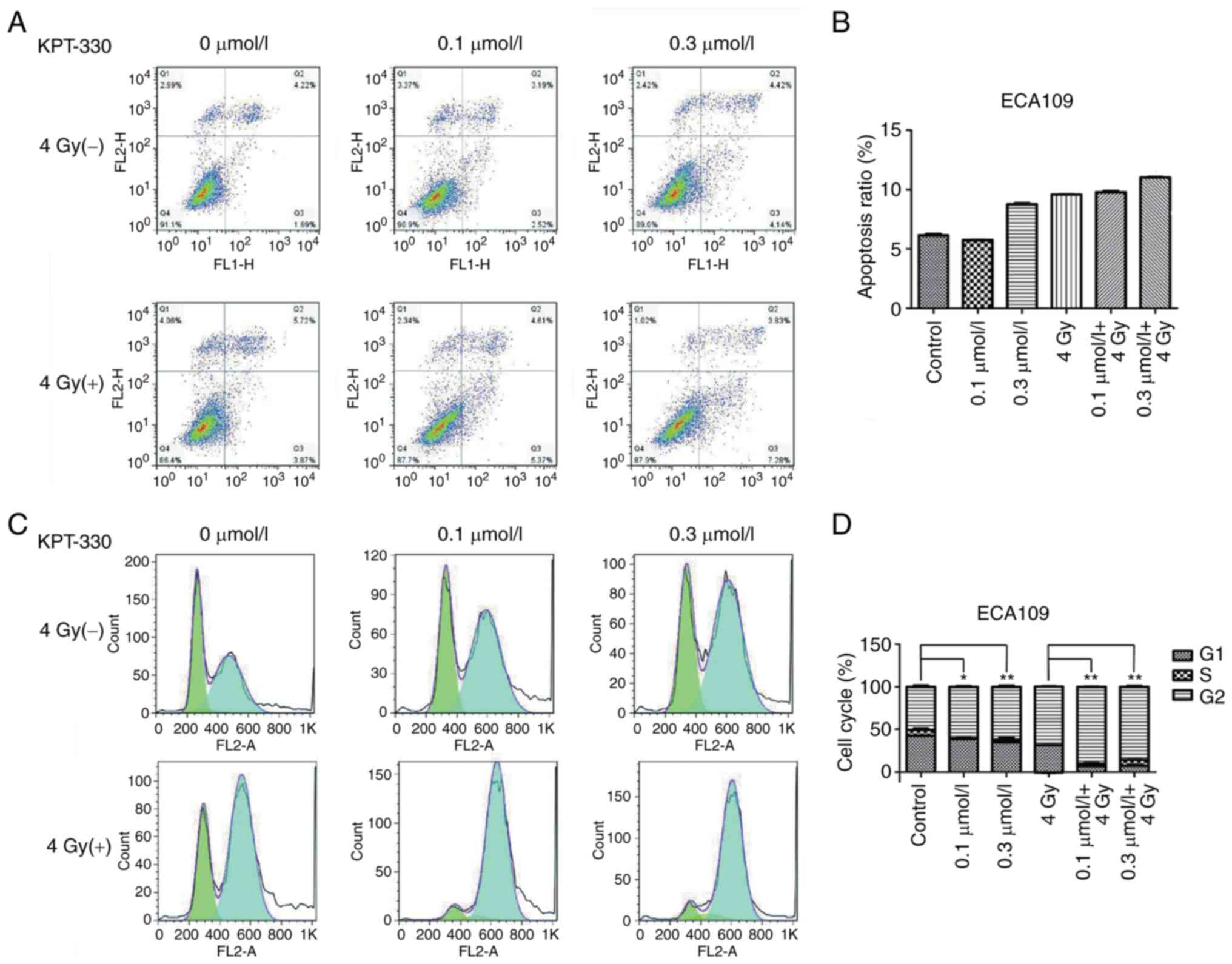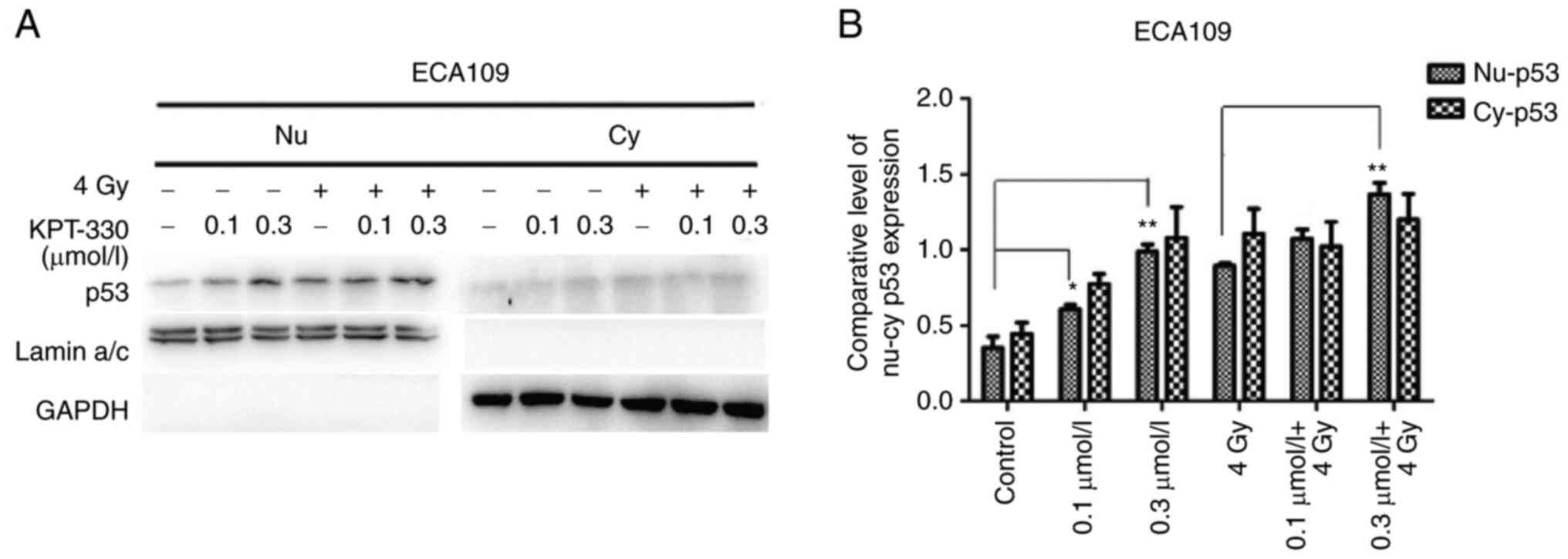|
1
|
Pennathur A, Gibson MK, Jobe BA and
Luketich JD: Oesophageal carcinoma. Lancet. 381:400–412.
2013.PubMed/NCBI View Article : Google Scholar
|
|
2
|
Smyth EC, Lagergren J, Fitzgerald RC,
Lordick F, Shah MA, Lagergren P and Cunningham D: Oesophageal
cancer. Nat Rev Dis Primers. 3(17048)2017.PubMed/NCBI View Article : Google Scholar
|
|
3
|
Chen W, Zheng R, Baade PD, Zhang S, Zeng
H, Bray F, Jemal A, Yu XQ and He J: Cancer statistics in China,
2015. CA Cancer J Clin. 66:115–132. 2016.PubMed/NCBI View Article : Google Scholar
|
|
4
|
Torre LA, Bray F, Siegel RL, Ferlay J,
Lortet-Tieulent J and Jemal A: Global cancer statistics, 2012. CA
Cancer J Clin. 65:87–108. 2015.PubMed/NCBI View Article : Google Scholar
|
|
5
|
Arnold M, Soerjomataram I, Ferlay J and
Forman D: Global incidence of oesophageal cancer by histological
subtype in 2012. Gut. 64:381–387. 2015.PubMed/NCBI View Article : Google Scholar
|
|
6
|
Rustgi A and El-Serag HB: Esophageal
carcinoma. N Engl J Med. 372:1472–1473. 2015.PubMed/NCBI View Article : Google Scholar
|
|
7
|
Huang RX and Zhou PK: DNA damage response
signaling pathways and targets for radiotherapy sensitization in
cancer. Signal Transduct Target Ther. 5:1–27. 2020.PubMed/NCBI View Article : Google Scholar
|
|
8
|
Conforti F, Zhang X, Rao G, Pas TD,
Yonemori Y, Rodriguez JA, McCutcheon JN, Rahhal R, Alberobello AT,
Wang Y, et al: Therapeutic effects of XPO1 inhibition in thymic
epithelial tumors. Cancer Res. 77:5614–5627. 2017.PubMed/NCBI View Article : Google Scholar
|
|
9
|
Karki R, Sundaram B, Sharma BR, Lee S,
Malireddi RKS, Nguyen LN, Christgen S, Zheng M, Wang Y, Samir P, et
al: ADAR1 restricts ZBP1-mediated immune response and PANoptosis to
promote tumorigenesis. Cell Rep. 37(109858)2021.PubMed/NCBI View Article : Google Scholar
|
|
10
|
Lv S, Song Q, Chen G, Cheng E, Chen W,
Cole R, Wu Z, Pascal LE, Wang K, Wipf P, et al: Regulation and
targeting of androgen receptor nuclear localization in
castration-resistant prostate cancer. J Clin Invest.
131(e141335)2021.PubMed/NCBI View Article : Google Scholar
|
|
11
|
Hamed M, Caspar B, Port SA and Kehlenbach
RH: A nuclear export sequence promotes CRM1-dependent targeting of
the nucleoporin Nup214 to the nuclear pore complex. J Cell Sci.
134(jcs258095)2021.PubMed/NCBI View Article : Google Scholar
|
|
12
|
Ferreira BI, Cautain B, Grenho I and Link
W: Small molecule inhibitors of CRM1. Front Pharmacol.
11(625)2020.PubMed/NCBI View Article : Google Scholar
|
|
13
|
Landes JR, Moore SA, Bartley BR, Doan HQ,
Rady PL and Tyring SK: The efficacy of selinexor (KPT-330), an XPO1
inhibitor, on non-hematologic cancers: A comprehensive review. J
Cancer Res Clin Oncol. 149:2139–2155. 2022.PubMed/NCBI View Article : Google Scholar
|
|
14
|
Gravina GL, Senapedis W, McCauley D,
Baloglu E, Shacham S and Festuccia C: Nucleo-cytoplasmic transport
as a therapeutic target of cancer. J Hematol Oncol.
7(85)2014.PubMed/NCBI View Article : Google Scholar
|
|
15
|
Azizian NG and Li Y: XPO1-dependent
nuclear export as a target for cancer therapy. J Hematol Oncol.
13(61)2020.PubMed/NCBI View Article : Google Scholar
|
|
16
|
Turner JG and Sullivan DM: CRM1-mediated
nuclear export of proteins and drug resistance in cancer. Curr Med
Chem. 15:2648–2655. 2008.PubMed/NCBI View Article : Google Scholar
|
|
17
|
Bykov VJN, Eriksson SE, Bianchi J and
Wiman KG: Targeting mutant p53 for efficient cancer therapy. Nat
Rev Cancer. 18:89–102. 2018.PubMed/NCBI View Article : Google Scholar
|
|
18
|
Borrero LJ and El-Deiry WS: Tumor
suppressor p53: Biology, signaling pathways, and therapeutic
targeting. Biochim Biophys Acta Rev Cancer.
1876(188556)2021.PubMed/NCBI View Article : Google Scholar
|
|
19
|
Yang X, Cheng L, Yao L, Ren H, Zhang S,
Min X, Chen X, Zhang J and Li M: Involvement of chromosome region
maintenance 1 (CRM1) in the formation and progression of esophageal
squamous cell carcinoma. Med Oncol. 31(155)2014.PubMed/NCBI View Article : Google Scholar
|
|
20
|
Fabbro M and Henderson BR: Regulation of
tumor suppressors by nuclear-cytoplasmic shuttling. Exp Cell Res.
282:59–69. 2003.PubMed/NCBI View Article : Google Scholar
|
|
21
|
Kastan MB: Wild-type p53: Tumors can’t
stand it. Cell. 128:837–840. 2007.PubMed/NCBI View Article : Google Scholar
|
|
22
|
Wu T, Chen W, Zhong Y, Hou X, Fang S, Liu
CY, Wang G, Yu T, Huang YY, Ouyang X, et al: Nuclear export of
ubiquitinated proteins determines the sensitivity of colorectal
cancer to proteasome inhibitor. Mol Cancer Ther. 16:717–728.
2017.PubMed/NCBI View Article : Google Scholar
|
|
23
|
Fragomeni RA, Chung HW, Landesman Y,
Senapedis W, Saint-Martin JR, Tsao H, Flaherty KT, Shacham S,
Kauffman M and Cusack JC: CRM1 and BRAF inhibition synergize and
induce tumor regression in BRAF-mutant melanoma. Mol Cancer Ther.
12:1171–1179. 2013.PubMed/NCBI View Article : Google Scholar
|
|
24
|
Rashal T, Elloul S, Crochiere M, Kashyap
T, Senapedis W, George R, Friedlander S, Ilouze M, Landesman Y,
Carlson R, et al: Selinexor (KPT-330) radio-sensitizes non-small
cell lung cancer cells in vitro and in vivo. Cancer Res. 75 (15
Suppl)(4490)2015.
|
|
25
|
Ferreiro-Neira I, Torres NE, Liesenfeld
LF, Chan CHF, Penson T, Landesman Y, Senapedis W, Shacham S, Hong
TS and Cusack JC: XPO1 inhibition enhances radiation response in
preclinical models of rectal cancer. Clin Cancer Res. 22:1663–1673.
2016.PubMed/NCBI View Article : Google Scholar
|
|
26
|
Kazim S, Malafa MP, Coppola D, Husain K,
Zibadi S, Kashyap T, Crochiere M, Landesman Y, Rashal T, Sullivan
DM and Mahipal A: Selective nuclear export inhibitor KPT-330
enhances the antitumor activity of gemcitabine in human pancreatic
cancer. Mol Cancer Ther. 14:1570–1581. 2015.PubMed/NCBI View Article : Google Scholar
|
|
27
|
Kuruvilla J, Savona M, Baz R, Mau-Sorensen
PM, Gabrail N, Garzon R, Stone R, Wang M, Savoie L, Martin P, et
al: Selective inhibition of nuclear export with selinexor in
patients with non-Hodgkin lymphoma. Blood. 129:3175–3183.
2017.PubMed/NCBI View Article : Google Scholar
|
|
28
|
Conforti F, Wang Y, Rodriguez JA,
Alberobello AT, Zhang YW and Giaccone G: Molecular pathways:
Anticancer activity by inhibition of nucleocytoplasmic shuttling.
Clin Cancer Res. 21:4508–4513. 2015.PubMed/NCBI View Article : Google Scholar
|
|
29
|
Dimopoulos MA, Richardson P and Lonial S:
Treatment options for patients with heavily pretreated relapsed and
refractory multiple myeloma. Clin Lymphoma Myeloma Leuk.
22:460–473. 2022.PubMed/NCBI View Article : Google Scholar
|
|
30
|
Lin D, Hao J, Nagata Y, Xu L, Shang L,
Meng X, Sato Y, Okuno Y, Varela AM, Ding LW, et al: Genomic and
molecular characterization of esophageal squamous cell carcinoma.
Nat Genet. 46:467–473. 2014.PubMed/NCBI View Article : Google Scholar
|
|
31
|
Van der Watt PJ, Zemanay W, Govender D,
Hendricks DT, Parker MI and Leaner VD: Elevated expression of the
nuclear export protein, Crm1 (exportin 1), associates with human
oesophageal squamous cell carcinoma. Oncol Rep. 32:730–738.
2014.PubMed/NCBI View Article : Google Scholar
|
|
32
|
Hu N, Clifford RJ, Yang HH, Wang C,
Goldstein AM, Ding T, Taylor PR and Lee MP: Genome wide analysis of
DNA copy number neutral loss of heterozygosity (CNNLOH) and its
relation to gene expression in esophageal squamous cell carcinoma.
BMC Genomics. 11(576)2010.PubMed/NCBI View Article : Google Scholar
|
|
33
|
Su H, Hu N, Yang HH, Wang C, Takikita M,
Wang QH, Giffen C, Clifford R, Hewitt SM, Shou JZ, et al: Global
gene expression profiling and validation in esophageal squamous
cell carcinoma and its association with clinical phenotypes. Clin
Cancer Res. 17:2955–2966. 2011.PubMed/NCBI View Article : Google Scholar
|
|
34
|
Stephens TC, Peacock JH, Shipley WU and
Steel GG: Response to continuous irradiation (CI) in relation to
the initial slope of the cell survival curve for tumours and bone
marrow. Br J Cancer Suppl. 6:271–274. 1984.PubMed/NCBI
|
|
35
|
Ortega JF, de Conti A, Tryndyak V, Furtado
KS, Heidor R, Horst MA, Fernandes LHG, Tavares PELM, Pogribna M,
Shpyleva S, et al: Suppressing activity of tributyrin on
hepatocarcinogenesis is associated with inhibiting the p53-CRM1
interaction and changing the cellular compartmentalization of p53
protein. Oncotarget. 7:24339–24347. 2016.PubMed/NCBI View Article : Google Scholar
|
|
36
|
Azmi AS, Muqbil I, Wu J, Aboukameel A,
Senapedis W, Baloglu E, Bollig-Fischer A, Dyson G, Kauffman M,
Landesman Y, et al: Targeting the nuclear export protein XPO1/CRM1
reverses epithelial to mesenchymal transition. Sci Rep. 5:1–13.
2015.PubMed/NCBI View Article : Google Scholar
|
|
37
|
Sun H, Hattori N, Chien W, Sun Q, Sudo M,
E-Ling GL, Ding L, Lim SL, Shacham S, Kauffman M, et al: KPT-330
has antitumour activity against non-small cell lung cancer. Brit J
Cancer. 111:281–291. 2014.PubMed/NCBI View Article : Google Scholar
|
|
38
|
Azmi AS, Aboukameel A, Bao B, Sarkar FH,
Philip PA, Kauffman M, Shacham S and Mohammad RM: Selective
inhibitors of nuclear export block pancreatic cancer cell
proliferation and reduce tumor growth in mice. Gastroenterology.
144:447–456. 2013.PubMed/NCBI View Article : Google Scholar
|
|
39
|
Huang W, Yue L, Qiu WS, Wang LW, Zhou XH
and Sun YJ: Prognostic value of CRM1in pancreas cancer. Clin Invest
Med. 32(E315)2009.PubMed/NCBI
|
|
40
|
Liu X, Chong Y, Tu Y, Liu N, Yue C, Qi Z,
Liu H, Yao Y, Liu H, Gao S, et al: CRM1/XPO1 is associated with
clinical outcome in glioma and represents a therapeutic target by
perturbing multiple core pathways. J Hematol Oncol. 9:1–14.
2016.PubMed/NCBI View Article : Google Scholar
|
|
41
|
Zhou F, Qiu W, Yao R, Xiang J, Sun X, Liu
S, Lv J and Yue L: CRM1 is a novel independent prognostic factor
for the poor prognosis of gastric carcinomas. Med Oncol.
30(726)2013.PubMed/NCBI View Article : Google Scholar
|
|
42
|
Chen Y, Camacho SC, Silvers TR, Razak ARA,
Gabrail NY, Gerecitano JF, Kalir E, Pereira E, Evans BR, Ramus SJ,
et al: Inhibition of the nuclear export receptor XPO1 as a
therapeutic target for platinum-resistant ovarian cancer. Clin
Cancer Res. 23:1552–1563. 2017.PubMed/NCBI View Article : Google Scholar
|
|
43
|
Marcus JM, Burke RT, DeSisto JA, Landesman
Y and Orth JD: Longitudinal tracking of single live cancer cells to
understand cell cycle effects of the nuclear export inhibitor,
selinexor. Sci Rep. 5(14391)2015.PubMed/NCBI View Article : Google Scholar
|
|
44
|
Wettersten HI, Landesman Y, Friedlander S,
Shacham S, Kauffman M and Weiss RH: Specific inhibition of the
nuclear exporter exportin-1 attenuates kidney cancer growth. PLoS
One. 9(e113867)2014.PubMed/NCBI View Article : Google Scholar
|
|
45
|
Yang J, Bill MA, Young GS, La Perle K,
Landesman Y, Shacham S, Kauffman M, Senapedis W, Kashyap T,
Saint-Martin JR, et al: Novel small molecule XPO1/CRM1 inhibitors
induce nuclear accumulation of TP53, phosphorylated MAPK and
apoptosis in human melanoma cells. PLoS One.
9(e102983)2014.PubMed/NCBI View Article : Google Scholar
|
|
46
|
Arango NP, Yuca E, Zhao M, Evans KW, Scott
S, Kim C, Gonzalez-Angulo AM, Janku F, Ueno NT, Tripathy D, et al:
Selinexor (KPT-330) demonstrates anti-tumor efficacy in preclinical
models of triple-negative breast cancer. Breast Cancer Res.
19:1–10. 2017.PubMed/NCBI View Article : Google Scholar
|
|
47
|
Ranganathan P, Kashyap T, Yu X, Meng X,
Lai TH, McNeil B, Bhatnagar B, Shacham S, Kauffman M, Dorrance AM,
et al: XPO1 inhibition using selinexor synergizes with chemotherapy
in acute myeloid leukemia by targeting DNA repair and restoring
topoisomerase IIα to the nucleus. Clin Cancer Res. 22:6142–6152.
2016.PubMed/NCBI View Article : Google Scholar
|
|
48
|
Shafique M, Ismail-Khan R, Extermann M,
Sullivan D, Goodridge D, Boulware D, Hogue D, Soliman H, Khong H
and Han HS: A phase II trial of selinexor (KPT-330) for metastatic
triple-negative breast cancer. Oncologist. 24:887–e416.
2019.PubMed/NCBI View Article : Google Scholar
|
|
49
|
Cheson BD, Nowakowski G and Salles G:
Diffuse large B-cell lymphoma: New targets and novel therapies.
Blood Cancer J. 11(68)2021.PubMed/NCBI View Article : Google Scholar
|
|
50
|
Wang D, Veo B, Pierce A, Fosmire S,
Madhavan K, Balakrishnan I, Donson A, Alimova I, Sullivan KD, Joshi
M, et al: A novel PLK1 inhibitor onvansertib effectively sensitizes
MYC-driven medulloblastoma to radiotherapy. Neuro Oncol.
24:414–426. 2022.PubMed/NCBI View Article : Google Scholar
|
|
51
|
Pawlik TM and Keyomarsi K: Role of cell
cycle in mediating sensitivity to radiotherapy. Int J Radiat Oncol
Biol Phys. 59:928–942. 2004.PubMed/NCBI View Article : Google Scholar
|
|
52
|
Inoue H, Kauffman M, Shacham S, Landesman
Y, Yang J, Evans CP and Weiss RH: CRM1 blockade by selective
inhibitors of nuclear export attenuates kidney cancer growth. J
Urol. 189:2317–2326. 2013.PubMed/NCBI View Article : Google Scholar
|
|
53
|
Stein Y, Rotter V and Aloni-Grinstein R:
Gain-of-function mutant p53: All the roads lead to tumorigenesis.
Int J Mol Sci. 20(6197)2019.PubMed/NCBI View Article : Google Scholar
|
|
54
|
van der Watt PJ and Leaner VD: The nuclear
exporter, Crm1, is regulated by NFY and Sp1 in cancer cells and
repressed by p53 in response to DNA damage. Biochim Biophys Acta.
1809:316–326. 2011.PubMed/NCBI View Article : Google Scholar
|
|
55
|
Krause K, Wasner M, Reinhard W, Haugwitz
U, Dohna CL, Mössner J and Engeland K: The tumour suppressor
protein p53 can repress transcription of cyclin B. Nucleic Acids
Res. 28:4410–4418. 2000.PubMed/NCBI View Article : Google Scholar
|
|
56
|
Tang X, Milyavsky M, Shats I, Erez N,
Goldfinger N and Rotter V: Activated p53 suppresses the histone
methyltransferase EZH2 gene. Oncogene. 23:5759–5769.
2004.PubMed/NCBI View Article : Google Scholar
|
|
57
|
Schmidt AK, Pudelko K, Boekenkamp JE,
Berger K, Kschischo M and Bastians H: The p53/p73-p21(CIP1) tumor
suppressor axis guards against chromosomal instability by
restraining CDK1 in human cancer cells. Oncogene. 40:436–451.
2021.PubMed/NCBI View Article : Google Scholar
|
|
58
|
Li C, Qin T, Liu Y, Wen H, Zhao J, Luo Z,
Peng W, Lu H, Duan C, Cao Y and Hu J: Microglia-derived exosomal
microRNA-151-3p enhances functional healing after spinal cord
injury by attenuating neuronal apoptosis via regulating the
p53/p21/CDK1 signaling pathway. Front Cell Dev Biol.
9(783017)2021.PubMed/NCBI View Article : Google Scholar
|
|
59
|
Kazim S, Malafa MP, Coppola D, Husain K,
Zibadi S, Kashyap T, Crochiere M, Landesman Y, Rashal T, Sullivan
DM and Mahipal A: Selective nuclear export inhibitor KPT-330
enhances the antitumor activity of gemcitabine in human pancreatic
cancer. Mol Cancer Ther. 14:1570–1581. 2015.PubMed/NCBI View Article : Google Scholar
|
|
60
|
Body S, Esteve-Arenys A, Miloudi H,
Recasens-Zorzo C, Tchakarska G, Moros A, Bustany S, Vidal-Crespo A,
Rodriguez V, Lavigne R, et al: Cytoplasmic cyclin D1 controls the
migration and invasiveness of mantle lymphoma cells. Sci Rep.
7:1–12. 2017.PubMed/NCBI View Article : Google Scholar
|















